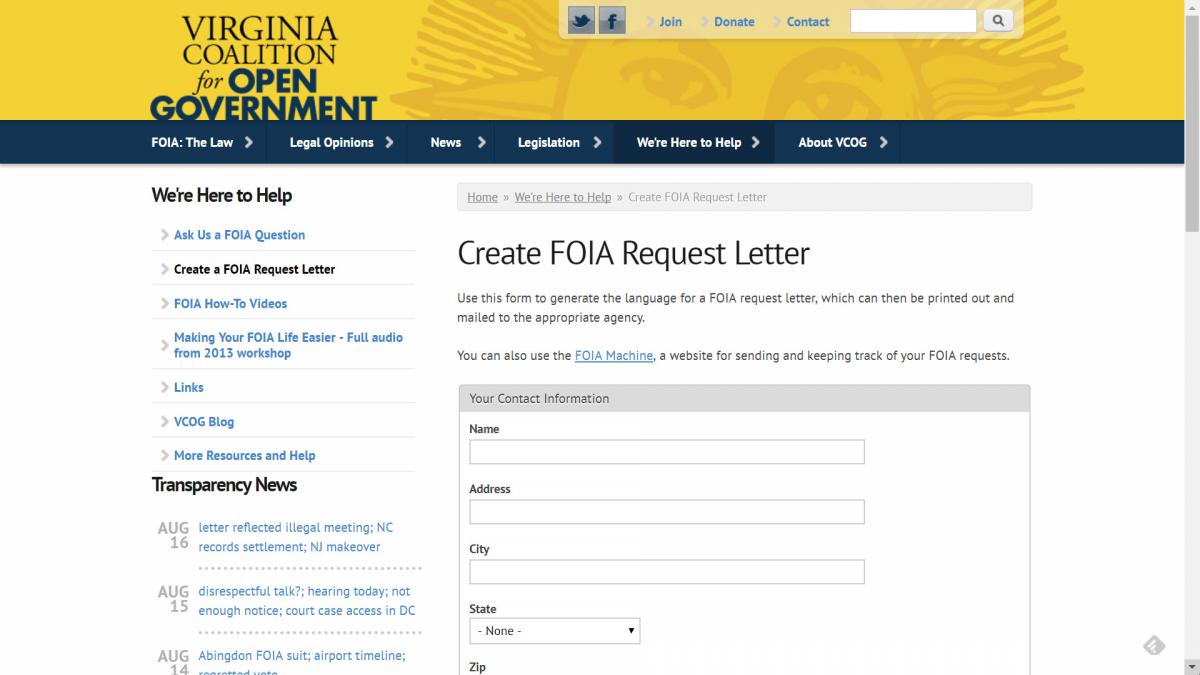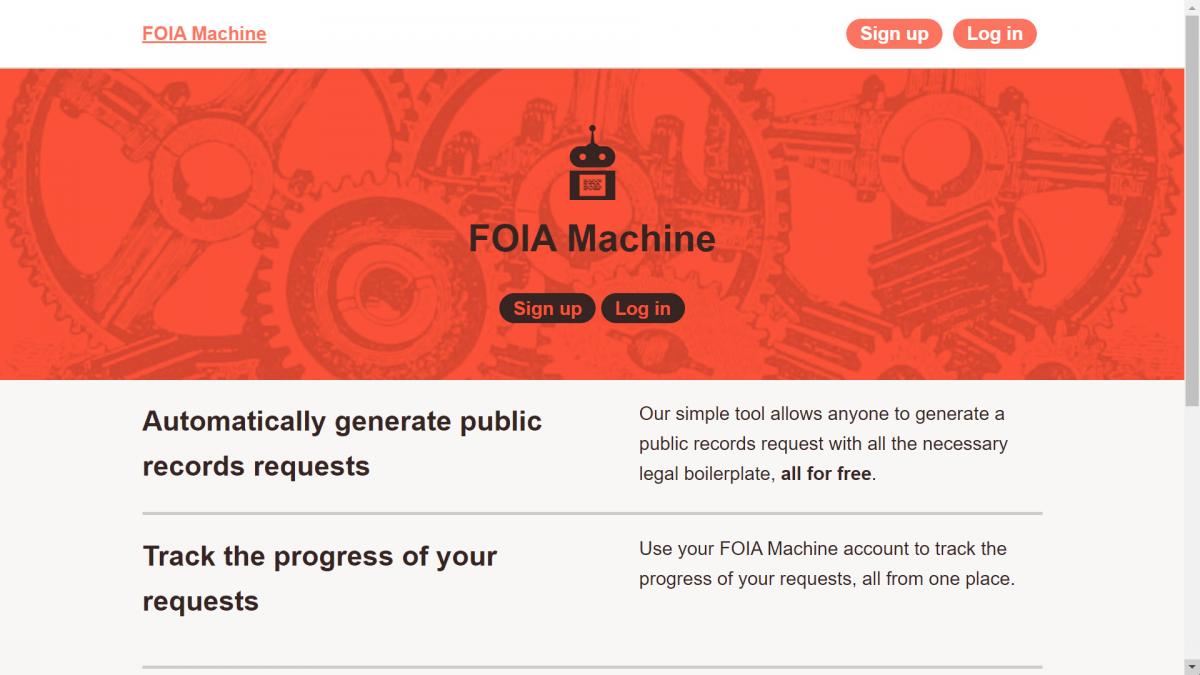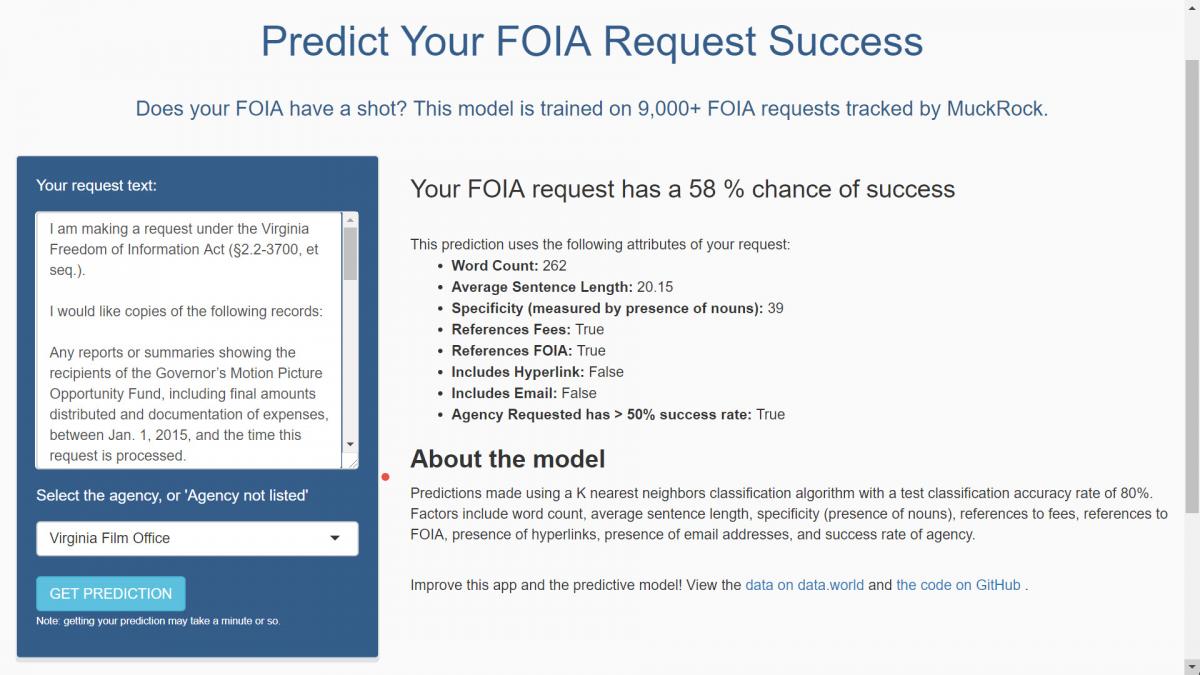Digital tools for managing FOIA requests

By Jeff South
Overcoming recalcitrant bureaucrats isn’t the only challenge for people who seek public documents or data under the Freedom of Information Act.
Another challenge is managing your paperwork: crafting and filing your FOIA requests and tracking responses.
Fortunately, a bevy of online tools is available to help you with those tasks. Here is a tour of such resources, building on a presentation I gave at VCOG’s Pop-Up Sunshine event in March.
Web-based FOIA letter generators
There’s no need to crack open a law book or start from scratch when writing your request. Several websites offer FOIA letter generators: You simply provide your name, the name (and preferably contact information) for the government agency you want to FOIA, and a description of the documents or data you’re seeking.
The generator sites then produce a professional-sounding letter with the appropriate legalistic language. You can copy the text into Microsoft Word, format it as you like (adding your letterhead, for example) and submit the request by email or snail-mail.
When seeking records from state and local agencies in Virginia, I often use VCOG’s “Create FOIA Request Letter” tool because it cites the state law – “the Virginia Freedom of Information Act (§2.2-3700, et seq.).” The VCOG letter template notes, for example, that records custodians have five working days to respond to the request (and can seek an additional seven days); that you are entitled to a cost estimate before the agency collects the records; and that “willful violation of the open records law can result in a fine of up to $2,500, for which you (government officials) can be held personally liable.”
(§2.2-3700, et seq.).” The VCOG letter template notes, for example, that records custodians have five working days to respond to the request (and can seek an additional seven days); that you are entitled to a cost estimate before the agency collects the records; and that “willful violation of the open records law can result in a fine of up to $2,500, for which you (government officials) can be held personally liable.”
The VCOG letter generator, like almost all of the tools I’ll discuss here, is free. Moreover, you don’t even have to register with the website to use it. The site prompts you to fill in an online form and then spits out the wording for your letter.
A similar tool is the FOIA Machine, which was created with support from the John S. Knight Foundation, the Center for Investigative Reporting, the nonprofit MuckRock Foundation and Kickstarter donations.
You must create an account on the FOIA Machine in order to create a records request. The template for the FOIA Machine’s letter asks for the jurisdiction (the United States of America or the state or city name) and for an agency (such as the Department of Justice or the State Police). The site then searches its database of government agencies and often can find an email address, mailing address, phone number and FOIA officer’s name and title. The FOIA Machine automatically populates its template with that information.
 The key part of the template is to specify what you want. The FOIA Machine then generates a letter reflecting the appropriate law. If you are making a request to federal officials, for example, the letter notes that they have 20 days to respond. If your request is intended for Virginia state or local officials, the letter notes that they have five days. However, on state-level requests, the FOIA Machine’s explanation of the law is not as explicit as VCOG’s template.
The key part of the template is to specify what you want. The FOIA Machine then generates a letter reflecting the appropriate law. If you are making a request to federal officials, for example, the letter notes that they have 20 days to respond. If your request is intended for Virginia state or local officials, the letter notes that they have five days. However, on state-level requests, the FOIA Machine’s explanation of the law is not as explicit as VCOG’s template.
Once the FOIA Machine generates your letter, you then can copy it into a Word document, format it appropriately and file it with a government agency.
Logging correspondence about your request
The FOIA Machine has two especially useful features:
- It creates a log for your request, noting the date it was filed and when the agency must respond. You can add emails and other notes to this log, so you have a complete trail of your pursuit of the public documents. You have the option to make your request and log public, which could help other people with their FOIAs.
- The FOIA Machine links to MuckRock’s public records guide, which explains the federal FOIA and each state law. (The guide for Virginia, for instance, notes that only Virginia citizens can FOIA government agencies in Virginia.) Moreover, tapping into MuckRock’s database, the Virginia guide displays FOIA requests that Virginia agencies recently have fulfilled, such as asset forfeiture statistics from the Virginia State Police and public comment documents from the Richmond Redevelopment and Housing Authority.
The Reporters Committee for Freedom of the Press also has a system to create and manage FOIA requests. It’s called iFOIA.org. Like the FOIA Machine, iFOIA requires you to register, it logs your request and creates a response trail, and it has guides about various FOIA laws and appeals processes.
But iFOIA does a few things the FOIA Machine doesn’t: You can use iFOIA to file requests directly by email, and iFOIA allows people to collaborate on a request, which could be useful on newsroom projects.
The Student Press Law Center’s website also hosts a FOIA letter generator. It’s only for local and state requests; for federal FOIAs, the center refers people to the Reporters Committee for Freedom of the Press.
The SPLC’s letter generator is like VCOG’s: You don’t have to register, and it kicks out text that is easy to format and submit. The SPLC customizes your request to the FOIA law of the state where you are seeking records. (But beware – the wording for Virginia is out of date. The template says, “I would note that willful violation of the open records law can result in a fine of up to $1,000.” In fact, as VCOG’s template shows, the penalty has been raised to $2,500.)
Another FOIA generator is available from MuckRock, which describes itself as “a non-profit, collaborative news site that brings together journalists, researchers, activists, and regular citizens to request, analyze, and share government documents, making politics more transparent and democracies more informed.”
The site, which requires registration, generates the text for FOIA requests with a fill-in-the-blanks wizard similar to the FOIA Machine’s interface. Although MuckRock displays proposed wording for your request so you can copy it into Word, the organization’s hope is that you will pay MuckRock a nominal sum to file it for you. The group charges $20 to file up to four requests.
MuckRock can be a godsend if you’re requesting records from a state that lets only its residents FOIA documents. Using volunteers in Virginia, MuckRock has represented residents of other states in filing FOIAs with government agencies in the commonwealth. Seven other states also have resident-specific language in their FOIA laws.
A database of FOIA requested and FOIA’d documents
For me, the unique utility of MuckRock is that in most cases, the FOIA requests filed by the group and the documents subsequently produced by government agencies are posted on the website. The FOIA requests are in a searchable database; you can filter the database by the request’s status (such as “Awaiting Response,” “Completed,” “Rejected” and “In Litigation”), jurisdiction, agency and keywords.
That feature allows you to see how successful requests have been crafted and what they have turned up. You may find that the information you’re seeking already has been released – and journalists can find inspiration in FOIAs other people have filed. MuckRock’s database includes more than 30,000 filed requests and 10,000 fulfilled FOIAs, prompting the release of more than 1.5 million pages of information.
From requests filed with Virginia agencies, you can peruse the state Department of Corrections’ policies regarding private prisons, emails among members of the University of Virginia Board of Visitors about Rolling Stone magazine’s since-discredited article about a supposed gang rape on campus, and the log of FOIA requests received in 2014 by the Department of Alcoholic Beverage Control.
Will your FOIA request be successful?
A new tool built on the MuckRock database tries to answer that question. It’s called the FOIA Predictor and was developed by Data.World, a platform for journalists and others to find, collaborate on and share data.
Before filing your FOIA request, you can paste the text into the FOIA Predictor form and identify the agency you’re planning to contact. The tool’s algorithm then analyzes the word count, average sentence length, specificity and other factors, as well as the agency’s track record responding to requests filed by MuckRock.
Based on those variables, the FOIA Predictor displays your request’s “chance of success” – such as 32 percent or 56 percent. If the score is low, you can tweak the text of your FOIA request and re-run the analysis.

Jeff South, a member of the VCOG Board of Directors, is an associate professor and director of undergraduate studies in the Robertson School of Media and Culture at Virginia Commonwealth University. Before moving into academia, he was a newspaper reporter and editor in Texas, Arizona and Virginia. South’s students at VCU have won more than 30 awards for political reporting and other coverage. He has received fellowships to study independent news outlets in Russia, teach journalism in China and train journalists in Ukraine.
Truth in the Field is a series of columns intended to encourage citizens' use of open government provisions. Contributors’ opinions are their own. For more information or to submit a column for potential publication, please contact the editor, Shelley Kimball, at kimball@gwu.edu.


Add new comment